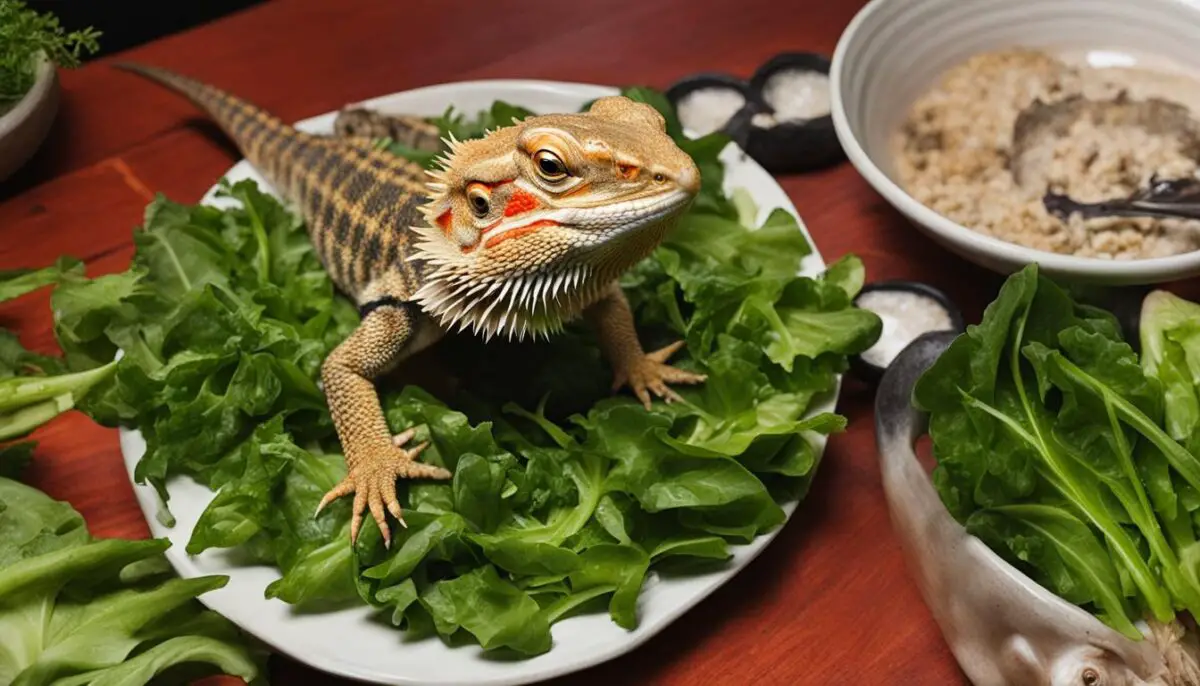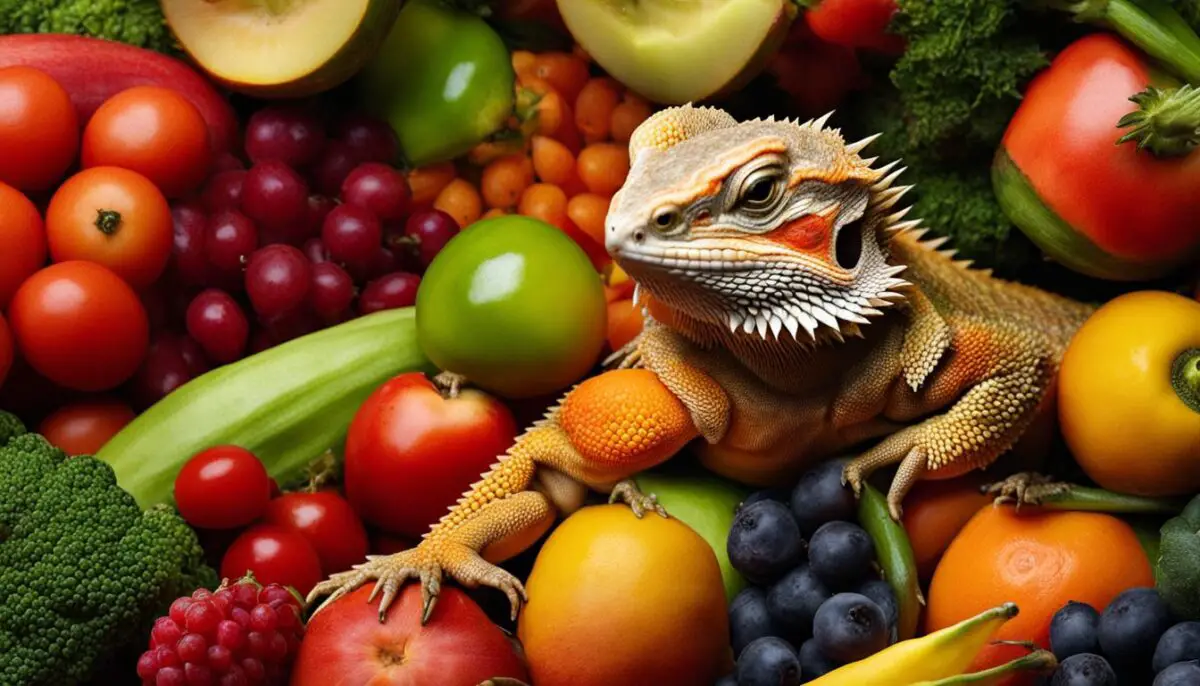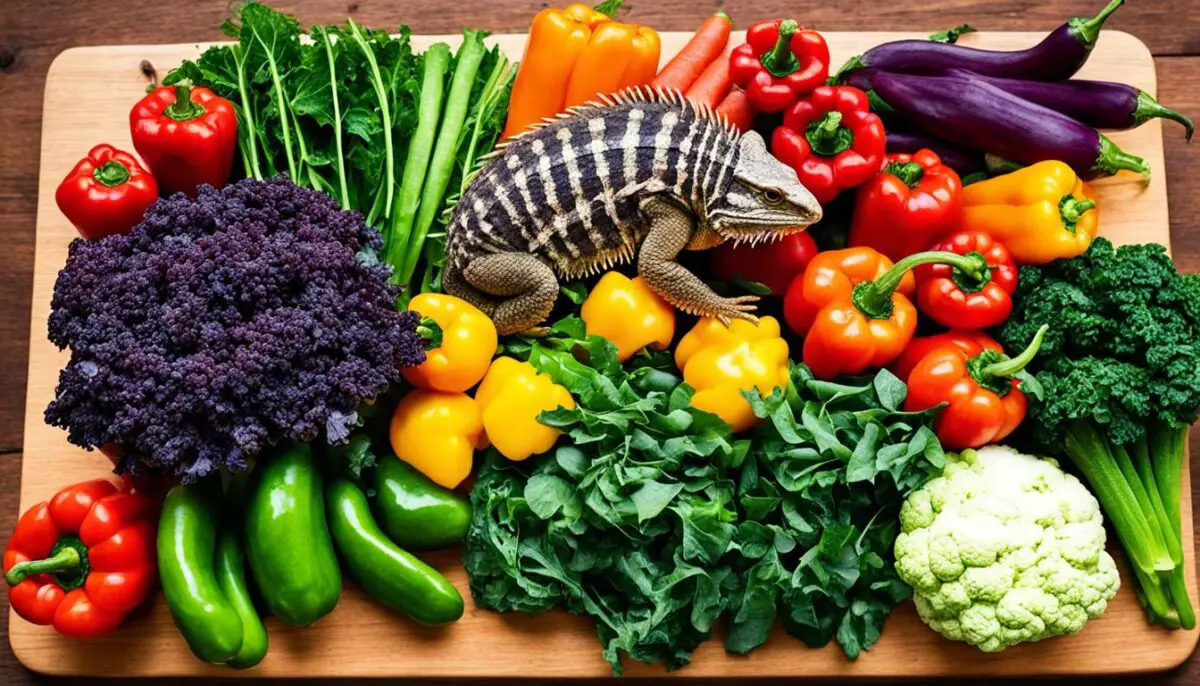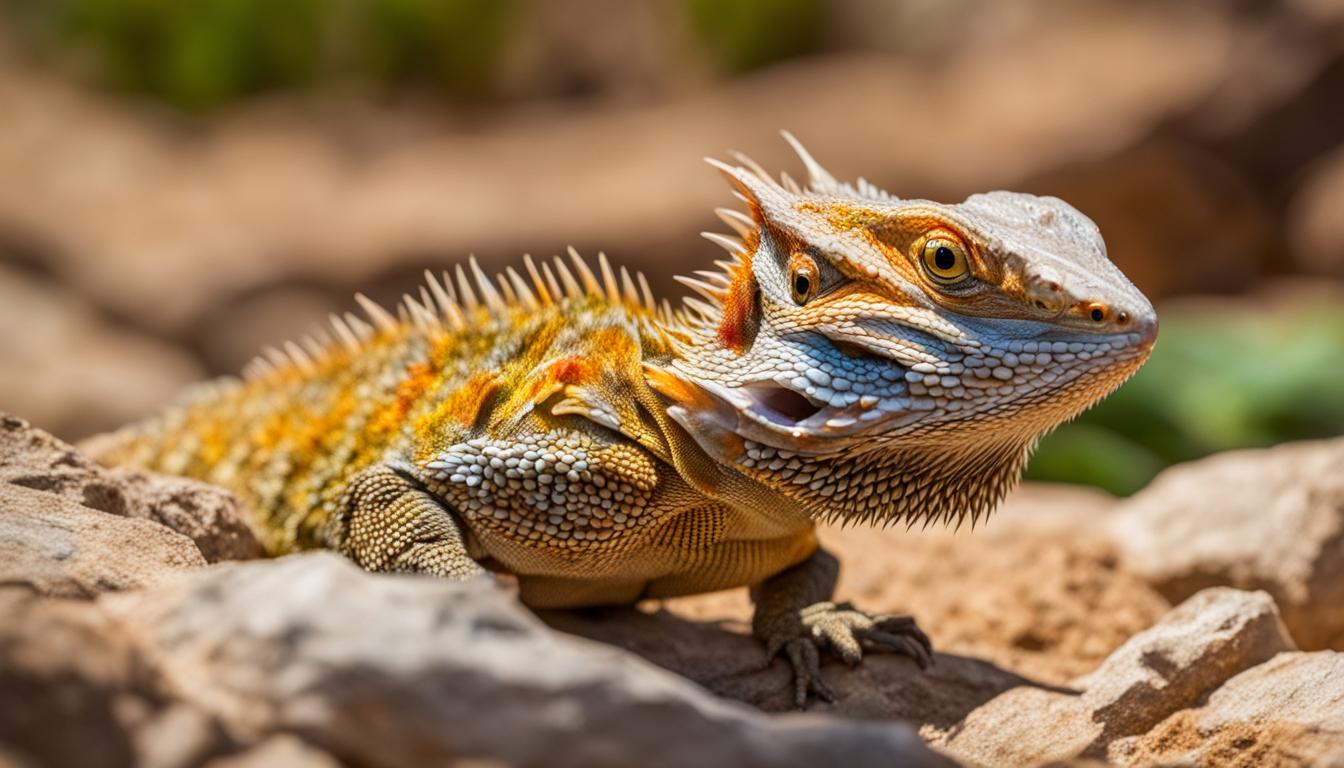When it comes to the diet of bearded dragons, it’s important to provide them with the best nutrition to ensure their health and well-being. One common question that arises is whether bearded dragons can eat chicken. Let’s explore this topic and find out if chicken is a safe food for these reptiles.
Feeding bearded dragons a balanced diet is essential for their growth and overall health. While chicken may seem like a protein option, it is not suitable for bearded dragons. Both raw and cooked chicken can pose significant risks to their digestive system and can potentially lead to severe illness or even death.
Bearded dragons require a specific balance of nutrients, including calcium, in their diet. Chicken has a high phosphorus content, which can disrupt the calcium-phosphorus ratio, increasing the risk of metabolic bone disease. This condition can cause pain, broken bones, and other serious health issues in bearded dragons.
It is best to avoid feeding chicken to bearded dragons altogether. Instead, focus on providing them with protein sources that are safe and beneficial for their health. Insects and worms, such as Dubia roaches, crickets, and mealworms, are excellent options. These can be dusted with calcium powder to ensure the proper intake of calcium.
Remember to offer a variety of plant-based foods as well to meet all their nutritional needs. Leafy greens, vegetables, and fruits can provide additional nutrients and enrichment for bearded dragons. It’s important to create a balanced diet that includes all the necessary vitamins and minerals.
Key Takeaways:
- Bearded dragons should not eat chicken as it can lead to severe illness and metabolic bone disease.
- Chicken has a high phosphorus content, which disrupts the calcium-phosphorus ratio in their diet.
- Safe protein options for bearded dragons include insects, such as Dubia roaches and crickets.
- Offer a variety of plant-based foods, including leafy greens, vegetables, and fruits, to meet their nutritional needs.
- Avoid overfeeding and provide calcium supplementation to ensure their overall health and well-being.
Why Can’t Bearded Dragons Eat Chicken?
Bearded dragons should not eat chicken due to several reasons. Firstly, the fat and protein in chicken are difficult for bearded dragons to digest, leading to potential digestive health issues. The main concern, however, is the imbalanced calcium-phosphorus ratio in chicken.
Bearded dragons require a high level of calcium in their diet for proper bone health, and chicken has low calcium and high phosphorus content. This can result in metabolic bone disease, a serious condition that can cause pain, broken bones, and even death. Therefore, it is crucial to avoid feeding chicken to bearded dragons.

Listed below are some key points as to why chicken should not be included in a bearded dragon’s diet:
- The fat and protein in chicken are difficult for bearded dragons to digest.
- Chicken has an imbalanced calcium-phosphorus ratio, which can lead to metabolic bone disease.
- Bearded dragons require a high level of calcium for proper bone health.
- Chicken has low calcium and high phosphorus content, leading to an imbalance in essential nutrients.
It is essential to provide a diet that meets the nutritional needs of bearded dragons and supports their overall health and well-being.
Better Alternatives to Chicken
While bearded dragons cannot eat chicken, there are many other protein options that are safe and beneficial for them. It’s important to provide a balanced and nutritious diet to ensure their health and well-being.
One excellent source of protein for bearded dragons is live feeder insects. These include Dubia roaches, crickets, and mealworms. These insects are not only rich in protein but also provide essential nutrients. To enhance their nutritional value, you can dust them with calcium powder before feeding them to your bearded dragon. This ensures that your pet receives sufficient calcium, which is essential for their bone health.
Other protein options for bearded dragons include waxworms, slugs, earthworms, and even tofu. These alternatives serve as appropriate protein sources and offer variety in their diet. It’s important to note that while tofu is a suitable protein option, it should be fed in moderation as bearded dragons primarily require animal protein.
Tip: For optimal nutrition, it’s recommended to provide a varied diet that includes different protein sources to ensure that your bearded dragon receives all the necessary nutrients.
In addition to protein, it’s crucial to incorporate a variety of vegetables and fruits into your bearded dragon’s diet. This provides them with essential vitamins, minerals, and fiber.
Here are some safe and nutritious plant-based options for your bearded dragon:
| Vegetables | Fruits |
|---|---|
| Mustard greens | Strawberries (in moderation) |
| Collard greens | Apples (in moderation) |
| Kale | Blueberries (in moderation) |
| Butternut squash | Mangoes (in moderation) |
It’s essential to provide a variety of vegetables and fruits to ensure that your bearded dragon receives a wide range of nutrients. Remember to wash them thoroughly before feeding and offer them in appropriate portion sizes.
By offering a balanced diet that includes protein sources, vegetables, and fruits, you can provide your bearded dragon with the nutrition they need to thrive.

Image: A bearded dragon enjoying a varied diet of insects, vegetables, and fruits.
The Importance of Calcium in a Bearded Dragon’s Diet
Calcium plays a critical role in the health and well-being of bearded dragons. It is essential for proper bone formation, muscle function, and overall growth. A balanced calcium-phosphorus ratio is crucial to prevent metabolic bone disease, a condition that can have serious consequences for bearded dragons.
Metabolic bone disease occurs when there is an imbalance in the calcium-phosphorus ratio in a bearded dragon’s diet. This imbalance can lead to weakened bones, deformities, and fractures, significantly impacting the dragon’s quality of life.
Ensuring that bearded dragons receive adequate calcium is vital for their long-term health. Calcium is necessary for the development and maintenance of strong bones, as well as for muscle and nerve function. Without sufficient calcium, bearded dragons are at risk of developing weakened bones and experiencing difficulties in movement.
To meet the calcium requirements of bearded dragons, it is essential to provide a diet that is rich in calcium and maintains the appropriate calcium-phosphorus ratio. Dusting the food with calcium powder is a common practice to ensure adequate calcium intake. Additionally, offering calcium-rich foods such as leafy greens can contribute to meeting their calcium needs.
Bearded dragons have specific dietary needs, and it is crucial to prioritize their bone health by providing them with the right amount of calcium. By understanding the importance of calcium in their diet, we can help ensure that these incredible reptiles thrive and live a healthy life.
| Calcium-rich Foods | Calcium Content (per 100g) |
|---|---|
| Kale | 150mg |
| Mustard Greens | 103mg |
| Collard Greens | 232mg |
| Turnip Greens | 190mg |
| Bok Choy | 105mg |
These calcium-rich foods can be incorporated into a bearded dragon’s diet to ensure their calcium requirements are met. However, it is essential to consult with a reptile veterinarian or a herpetologist to determine the specific dietary needs of your bearded dragon and ensure you are providing the optimal calcium-phosphorus ratio.

Feeding Schedule and Portion Control for Bearded Dragons
Establishing a feeding schedule and practicing portion control is essential for maintaining a healthy weight and overall well-being in bearded dragons. By following feeding guidelines and providing portioned meals, you can ensure that your bearded dragon receives the appropriate nutrients without overeating.
Bearded dragons have different feeding requirements based on their age and size. Young bearded dragons, between 0-6 months old, need more frequent feedings to support their growing bodies. They should be fed 2-3 times a day, with a combination of protein sources and plant-based foods.
As bearded dragons reach adulthood, around 6-18 months old, their feeding schedule can be adjusted to once every 1-2 days. Adult bearded dragons have lower energy requirements and need fewer feedings to maintain their weight. A balanced diet with varied protein sources and vegetables can meet their nutritional needs.
It’s important to monitor portion sizes when feeding bearded dragons. Overfeeding can lead to weight gain and associated health issues. Provide an appropriate amount of food based on your bearded dragon’s size and appetite. Remember that portion control is crucial for maintaining optimal health.
Here are some feeding guidelines to help you establish a feeding schedule and practice portion control for your bearded dragon:
- Feed young bearded dragons (0-6 months old) 2-3 times a day, with a balanced mix of protein sources and plant-based foods.
- Offer adult bearded dragons (6 months and older) meals once every 1-2 days, consisting of varied protein sources and vegetables.
- Monitor the size of food portions to prevent overeating. Adjust the quantity based on your bearded dragon’s appetite and body condition.
- Remove any uneaten food after each feeding session to maintain a clean and hygienic enclosure.
- Consider using a feeding schedule chart or log to track the frequency and portion sizes of meals for your bearded dragon.
Remember, every bearded dragon is unique, and their feeding needs may vary. Keep an eye on their weight and overall condition to make adjustments to their feeding schedule and portion sizes as needed.
| Age | Feeding Frequency | Protein Sources | Plant-Based Foods |
|---|---|---|---|
| 0-3 months | 2-3 times a day | Small insects (crickets, mealworms), small pieces of cooked vegetables | Leafy greens (collard greens, mustard greens), small amounts of fruits |
| 3-6 months | 2 times a day | Insects (crickets, dubia roaches), larger pieces of cooked vegetables | Expanded variety of leafy greens, occasional fruits |
| 6 months and older | Once every 1-2 days | Insects (crickets, dubia roaches, superworms), occasional pinky mice for adult dragons | Wide range of vegetables, occasional fruits |
Conclusion
In conclusion, it is not recommended to feed chicken to bearded dragons as part of their diet. Chicken can pose health risks for these reptiles, affecting their digestion and disrupting the crucial calcium-phosphorus ratio in their bodies. This imbalance can lead to a serious condition called metabolic bone disease. It is essential to provide a balanced and nutritious diet to ensure the well-being of bearded dragons.
Instead of chicken, bearded dragons should be fed a variety of safe and appropriate foods. Protein sources such as insects and worms, like Dubia roaches, crickets, and mealworms, offer the necessary nutrients for their growth and development. To meet their calcium requirements, dusting the insects with calcium powder is recommended. Additionally, a diverse selection of plant-based foods, including leafy greens like mustard greens, turnip greens, and collard greens, contribute to their overall nutritional needs.
Proper calcium supplementation and portion control are vital aspects of a bearded dragon’s diet. Calcium is crucial for their bone health, muscle function, and growth. By maintaining a balanced calcium-phosphorus ratio and adhering to a regular feeding schedule, bearded dragons can thrive and live a healthy life. It is important to consult with a reptile veterinarian or trusted professional to ensure that the bearded dragon’s dietary needs are being met and to address any concerns or questions you may have.
FAQ
Can bearded dragons eat chicken?
No, bearded dragons should not eat chicken as it can lead to severe illness and even death. Chicken is difficult for bearded dragons to digest and does not provide the necessary balance of nutrients, especially calcium. It is best to avoid feeding chicken to bearded dragons and opt for other protein sources such as insects and worms.
Why can’t bearded dragons eat chicken?
Bearded dragons cannot eat chicken due to several reasons. The fat and protein content in chicken are difficult for bearded dragons to digest, leading to potential digestive health issues. Moreover, chicken has low calcium and high phosphorus content, which can disrupt the calcium-phosphorus ratio in the bearded dragon’s diet. This imbalance can result in metabolic bone disease, a serious condition that can cause pain, broken bones, and even death.
What are better alternatives to chicken for bearded dragons?
Instead of chicken, bearded dragons can be offered a variety of protein sources that are safe and beneficial for them. Live feeder insects such as Dubia roaches, crickets, and mealworms are excellent options. These insects can be dusted with calcium powder to ensure the proper intake of calcium. Other protein options include waxworms, slugs, earthworms, and tofu.
How important is calcium in a bearded dragon’s diet?
Calcium is crucial for a bearded dragon’s health and well-being. It is essential for proper bone formation, muscle function, and overall growth. A balanced calcium-phosphorus ratio is necessary to prevent metabolic bone disease, a condition that can lead to serious health issues in bearded dragons. Providing a diet rich in calcium and maintaining the appropriate calcium-phosphorus ratio is essential for their long-term health.
What are the feeding guidelines for bearded dragons?
When feeding bearded dragons, it is important to offer a variety of protein sources such as insects and worms, along with a balanced diet of vegetables and fruits. Young bearded dragons may require more protein-rich foods and gradually increase the proportion of plant-based foods as they mature. Calcium supplementation through dusting the food or providing calcium-rich foods is essential to prevent calcium deficiencies. Feeding should be done on a regular schedule, and uneaten food should be removed to maintain hygiene in the enclosure.
What plant foods can bearded dragons eat?
Bearded dragons can consume a variety of plant-based foods. Leafy greens such as mustard greens, endive, turnip greens, and collard greens are excellent choices. Other vegetables like sweet potatoes and squash can provide additional nutrients. Fruits such as strawberries and apples can be offered in moderation as a treat. It is important to provide a diverse range of plant foods to ensure that bearded dragons receive all the necessary vitamins and minerals for their overall health.
What is the recommended feeding schedule and portion control for bearded dragons?
Establishing a feeding schedule and practicing portion control is essential for maintaining a healthy weight and overall well-being in bearded dragons. Young bearded dragons may eat multiple times a day, while adult dragons may only require feeding once every 1-2 days. It is important not to overfeed bearded dragons as they can easily become overweight. Limiting the amount of food and monitoring their feeding time can help prevent overeating and ensure they receive the appropriate amount of nutrients.
Can bearded dragons eat meat?
While bearded dragons are omnivorous, it is generally not recommended to feed them meat, including chicken. Their diet should primarily consist of protein sources such as insects and worms, along with a variety of plant-based foods. Feeding meat to bearded dragons can lead to digestive issues and imbalances in their nutrient intake. Stick to a diverse diet of insects, vegetables, and fruits to ensure their nutritional needs are met.

